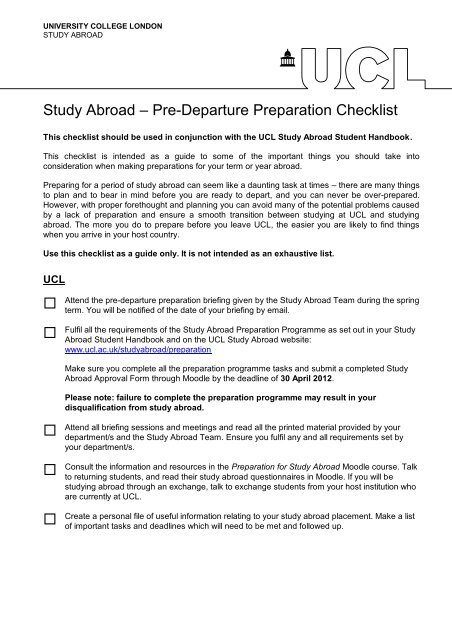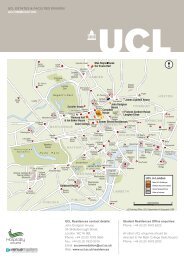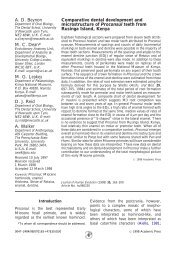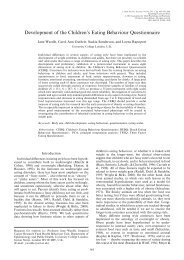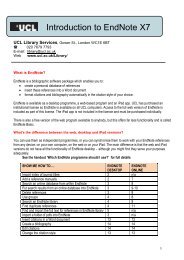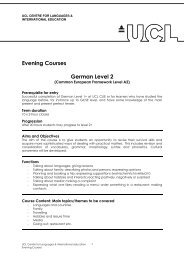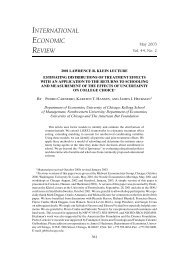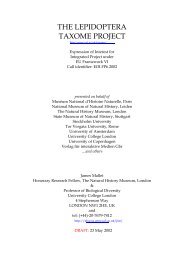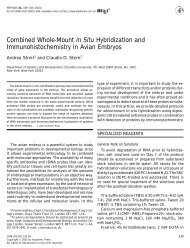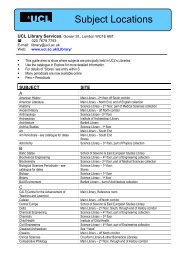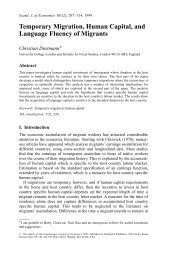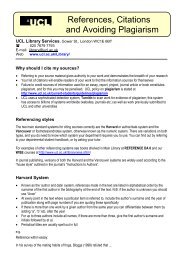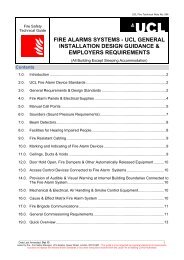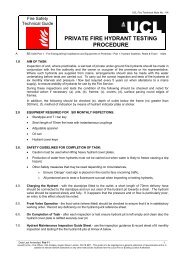Study Abroad – Pre-Departure Preparation Checklist - UCL
Study Abroad – Pre-Departure Preparation Checklist - UCL
Study Abroad – Pre-Departure Preparation Checklist - UCL
Create successful ePaper yourself
Turn your PDF publications into a flip-book with our unique Google optimized e-Paper software.
UNIVERSITY COLLEGE LONDON<br />
STUDY ABROAD<br />
<strong>Study</strong> <strong>Abroad</strong> <strong>–</strong> <strong>Pre</strong>-<strong>Departure</strong> <strong>Pre</strong>paration <strong>Checklist</strong><br />
This checklist should be used in conjunction with the <strong>UCL</strong> <strong>Study</strong> <strong>Abroad</strong> Student Handbook.<br />
This checklist is intended as a guide to some of the important things you should take into<br />
consideration when making preparations for your term or year abroad.<br />
<strong>Pre</strong>paring for a period of study abroad can seem like a daunting task at times <strong>–</strong> there are many things<br />
to plan and to bear in mind before you are ready to depart, and you can never be over-prepared.<br />
However, with proper forethought and planning you can avoid many of the potential problems caused<br />
by a lack of preparation and ensure a smooth transition between studying at <strong>UCL</strong> and studying<br />
abroad. The more you do to prepare before you leave <strong>UCL</strong>, the easier you are likely to find things<br />
when you arrive in your host country.<br />
Use this checklist as a guide only. It is not intended as an exhaustive list.<br />
<strong>UCL</strong><br />
<br />
<br />
<br />
<br />
<br />
Attend the pre-departure preparation briefing given by the <strong>Study</strong> <strong>Abroad</strong> Team during the spring<br />
term. You will be notified of the date of your briefing by email.<br />
Fulfil all the requirements of the <strong>Study</strong> <strong>Abroad</strong> <strong>Pre</strong>paration Programme as set out in your <strong>Study</strong><br />
<strong>Abroad</strong> Student Handbook and on the <strong>UCL</strong> <strong>Study</strong> <strong>Abroad</strong> website:<br />
www.ucl.ac.uk/studyabroad/preparation<br />
Make sure you complete all the preparation programme tasks and submit a completed <strong>Study</strong><br />
<strong>Abroad</strong> Approval Form through Moodle by the deadline of 30 April 2012.<br />
Please note: failure to complete the preparation programme may result in your<br />
disqualification from study abroad.<br />
Attend all briefing sessions and meetings and read all the printed material provided by your<br />
department/s and the <strong>Study</strong> <strong>Abroad</strong> Team. Ensure you fulfil any and all requirements set by<br />
your department/s.<br />
Consult the information and resources in the <strong>Pre</strong>paration for <strong>Study</strong> <strong>Abroad</strong> Moodle course. Talk<br />
to returning students, and read their study abroad questionnaires in Moodle. If you will be<br />
studying abroad through an exchange, talk to exchange students from your host institution who<br />
are currently at <strong>UCL</strong>.<br />
Create a personal file of useful information relating to your study abroad placement. Make a list<br />
of important tasks and deadlines which will need to be met and followed up.
Make sure you understand what is required of you academically while abroad. Speak to your<br />
departmental <strong>Study</strong> <strong>Abroad</strong> Tutor to find out how many credits or modules you are required to<br />
take, what courses your department expects you to take, and how the work you complete<br />
abroad will be converted into academic credit at <strong>UCL</strong>. You are expected to familiarise yourself<br />
with the details of any and all work set by your department as well as all relevant details<br />
regarding submission and assessment.<br />
During the course of your time abroad, you will be required to complete and return several<br />
important forms and documents to the <strong>Study</strong> <strong>Abroad</strong> Team by specified deadlines. Make sure<br />
you are aware of all paperwork requirements and deadlines. If in doubt, contact the <strong>Study</strong><br />
<strong>Abroad</strong> Team.<br />
Sign up for the User Authentication System so that you can reset your <strong>UCL</strong> password without<br />
having to visit the <strong>UCL</strong> IS helpdesk in person. All correspondence from <strong>UCL</strong> during your time<br />
abroad will be via your <strong>UCL</strong> email address. It is important that you regularly log-in to your<br />
account to keep it active. Accounts that are left dormant for too long are frozen and passwords<br />
will only be re-issued over the phone if you have already registered for the User Authentication<br />
System.<br />
To register, please see the instructions on the following webpage:<br />
www.ucl.ac.uk/isd/students/connections/passwords.<br />
If you are disabled, dyslexic or have a medical condition that affects your studies you will need<br />
to consider whether you need any particular arrangements or support during your study abroad.<br />
You are welcome to contact Student Disability Services to discuss this. You will also need to<br />
discuss this with your <strong>Study</strong> <strong>Abroad</strong> Tutor.<br />
Students with exceptional special needs who participate in the Erasmus programme may be<br />
eligible for extra funding to meet additional costs. Information about this can be obtained from<br />
the <strong>Study</strong> <strong>Abroad</strong> Team.<br />
Your Host Institution<br />
<br />
<br />
<br />
<br />
<br />
Make sure you know how to apply to your host institution and what their deadlines are. Most<br />
institutions will have their application forms available for download from their websites. If in<br />
doubt about the application process, ask your departmental <strong>Study</strong> <strong>Abroad</strong> Tutor or, where<br />
applicable, the <strong>Study</strong> <strong>Abroad</strong> Team, for guidance.<br />
Make sure that you make an application to your host institution. It is not sufficient for<br />
your department at <strong>UCL</strong> to tell you that you have been given an exchange place. You<br />
must send your host institution a formal application and comply with all their application<br />
procedures. If you do not send them an application, they will not be expecting you and<br />
you will not be allowed to enrol if you arrive unannounced.<br />
Make sure you submit your application in good time. If your application is rejected because it is<br />
late, this will have serious implications for your year abroad. If the application procedure<br />
requires you to provide an official <strong>UCL</strong> transcript, be aware that these take up to two weeks to<br />
produce, so plan ahead and order your transcript early.<br />
If you can, apply early. As a general rule, the earlier you apply, the earlier you are likely to<br />
receive confirmation of acceptance from your host institution.<br />
After you send them your application, make sure that the host institution has received it.
Finance<br />
<br />
<br />
<br />
<br />
<br />
<br />
Investigate the courses available to you at your host institution. Are there any subjects or<br />
courses which will not be open to you as an exchange/non-degree student? Will you be able to<br />
take courses from a number of different departments, or only one department? If you identify<br />
any potential conflicts between the courses your department at <strong>UCL</strong> expects you to take and<br />
the courses you will be allowed to take by your host institution, please discuss this with your<br />
departmental <strong>Study</strong> <strong>Abroad</strong> Tutor.<br />
When does course registration take place? Does it happen on arrival at the start of term, or do<br />
you need to sign up for courses online beforehand?<br />
Find out what the term dates are and when you are expected to be at your host institution. Is<br />
there an orientation programme which you should attend prior to the start of term?<br />
Make a note of contact details for useful contacts at your host institution. You may find it useful<br />
to have phone numbers and email addresses for the international office, the accommodation<br />
office and the relevant academic department(s) there in case you need to get in touch with<br />
them.<br />
Draw up a tentative budget for your time abroad. Do some research into living costs in your<br />
host country. Be realistic. Identify both sources of income and expenditure including amounts<br />
for travel, visas, accommodation, subsistence etc. Don't forget to include leisure activities and<br />
an amount set-aside for unexpected emergencies.<br />
If you normally work part-time during term-time at <strong>UCL</strong>, be aware that it may not be as easy to<br />
find part-time work in your host country as it is in the UK. If you are studying outside the<br />
European Union, the terms of your visa may prohibit you from working altogether. Take this into<br />
account when drawing up your budget, and do not depend on being able to work in order to<br />
support yourself financially while abroad.<br />
Your student loan and Erasmus grant (where applicable) will most likely be paid after you begin<br />
your study abroad placement, so make sure you have enough money to support yourself for<br />
the first few months, including money for one-off expenses such as housing deposits, university<br />
registration fees, compulsory health insurance (students studying in the USA, Canada and<br />
Australia only) etc.<br />
Consider applying for a <strong>Study</strong> <strong>Abroad</strong> Bursary. The <strong>Study</strong> <strong>Abroad</strong> Bursary fund has been<br />
established by <strong>UCL</strong> to provide an additional source of financial support for students who wish to<br />
undertake a study abroad placement. All bursaries are given on the basis of financial need. The<br />
value of each bursary will usually be restricted to a maximum of £300 for students intending to<br />
study in Europe and £500 for students intending to study elsewhere.<br />
The deadline for <strong>Study</strong> <strong>Abroad</strong> Bursary applications is 30 April 2012. Visit<br />
http://www.ucl.ac.uk/studyabroad/finance for further details.<br />
If you normally receive a student maintenance loan or maintenance grant, apply for your loan<br />
and/or grant in the normal way. <strong>UCL</strong> will write to your Local Authority to inform them of your year<br />
abroad plans.<br />
If you receive a means-tested student loan in the UK, you may be eligible to have some of the<br />
additional costs related to your study abroad placement refunded (e.g. flights, insurance, visa<br />
costs). Contact your Local Authority or Regional Authority (e.g. Student Finance England) for<br />
details.<br />
Your student loan will normally be paid at the start of the <strong>UCL</strong> academic year, in late<br />
September. However, if your study abroad placement starts earlier than this it may be possible
Travel<br />
<br />
<br />
<br />
<br />
<br />
for you to request that your loan be paid early. Contact your Local Authority or Regional<br />
Authority for details.<br />
Before you leave the UK, inform your bank that you will be going abroad, to which country(ies)<br />
and for how long. If you do not inform your bank of your travel plans they may block your credit<br />
or debit cards if they detect what they consider to be unexpected or suspicious transactions<br />
overseas.<br />
Set up internet banking for your UK accounts so that you can keep track of your finances while<br />
you are abroad.<br />
Look into the possibility of opening a bank account in your host country. Bear in mind that you<br />
may need to open a local account in order to pay rent or if you intend to work in your host<br />
country. A good source of information about opening a bank account in the EU is Monetos:<br />
http://www.monetos.co.uk/service/.<br />
Ask your bank in the UK about the cost of transferring money to an account overseas and the<br />
cost of withdrawing money directly from your UK account while abroad. Which is more cost<br />
effective? You may also want to consider purchasing a pre-paid foreign currency card. This is a<br />
chip-and-pin-protected card which you can top up by cash, debit card, credit card or bank<br />
transfer, and then use to withdraw money or make purchases overseas. Providers of pre-paid<br />
foreign currency cards include the Post Office (Travel Money Card), FairFX(Euro Currency<br />
Card, US Dollar Card and Anywhere Card) and Travelex (Cash Passport).<br />
Investigate the different options carefully to determine which is the most convenient and<br />
inexpensive method of accessing your cash while abroad.<br />
Erasmus students only: make sure you return your Erasmus grant contract to <strong>UCL</strong> on time.<br />
This contract will be sent to you by email in June and you will need to sign and return it to <strong>UCL</strong><br />
by 31 July in order to qualify for an Erasmus grant.<br />
Find out how to get to your host institution. What is the quickest and most convenient route?<br />
How much will tickets cost?<br />
Find out when you need to be at your host institution. If you want to arrive early to settle in<br />
before the start of your placement, factor this into your travel plans.<br />
If you receive a means-tested student loan in the UK, you may be able to claim back part of<br />
your travel costs . Ask your Local Authority or Regional Authority for details before you book<br />
your tickets.<br />
Book your tickets. Investigate whether it is better to buy single or return tickets. Are there weight<br />
restrictions on baggage? Do some airlines offer a more generous baggage allowance than<br />
others?<br />
Before leave, make a plan to contact your relatives or friends at home upon arrival at your<br />
destination, to let them know that you have arrived safely.<br />
Accommodation<br />
<br />
Explore the housing options available to you. Does your host institution provide<br />
accommodation? If so, what is the university accommodation like? If your host institution does<br />
not provide accommodation, you will have to find private accommodation. Give some thought to
the type of accommodation you would prefer. Would you prefer to live by yourself, or in a<br />
shared house/flat? Who would you like to share with? Locals? Other foreigners? Other <strong>UCL</strong><br />
students? Would you prefer to live with a local host family?<br />
Investigate the costs of the different options. If you are thinking of opting for private<br />
accommodation, investigate the likely terms of a rental contract in your host country. If you rent<br />
privately you may be required to sign a 12-month tenancy agreement - this may not be ideal if<br />
you plan to be there for less than a full calendar year.<br />
If you plan to apply for university accommodation, be aware of your host institution’s housing<br />
application deadlines. Make sure you submit your application on time.<br />
If you plan to secure private accommodation, consult the <strong>Study</strong> <strong>Abroad</strong> Questionnaires written<br />
by previous <strong>UCL</strong> students for tips about where to look, which neighbourhoods to avoid etc. Your<br />
host institution may also have a housing service which can help you to find private<br />
accommodation.<br />
Consider travelling to your host country a few weeks in advance to look for permanent<br />
accommodation before the start of your placement. Look into the possibility of arranging<br />
temporary accommodation for your first few days or weeks until you find somewhere<br />
permanent.<br />
NB. In many European countries, it can be difficult to secure accommodation for the coming<br />
year during the month of August, as many people are away on holiday and many businesses<br />
are closed. You may therefore wish to consider going out earlier (e.g. June/July) for a short trip<br />
to make housing arrangements ahead of your return in the autumn.<br />
Passport and ID Documents<br />
<br />
<br />
<br />
<br />
<br />
<br />
Ensure that your passport will be valid for at least six months after the end of your stay abroad.<br />
Take several photocopies of your passport, birth certificate, and visa (where applicable) with<br />
you. You may want to consider scanning copies and emailing them to yourself so that you can<br />
access them while abroad.<br />
Take several passport photographs with you. You may need to provide a number of passport<br />
photos as part of the enrolment process at your host institution, as well as for other<br />
administrative procedures in the host country, so it is a good idea to have a small supply of<br />
photos ready beforehand.<br />
Leave a copy of your insurance policy and a photocopy of your passport with someone at<br />
home, so that they have access to them in the event of an emergency.<br />
If you are studying abroad within Europe, you must have a valid European Health Insurance<br />
Card (EHIC). The EHIC allows you to access state-provided healthcare in all EEA countries and<br />
Switzerland. You may be asked to show proof that you have a valid EHIC before you are<br />
allowed to enrol at your host university. To obtain the EHIC you must apply by post using the<br />
application form and pre-addressed envelope available at any post office. As a student<br />
undertaking study abroad you have to provide additional information regarding your placement<br />
and therefore online applications are not acceptable. Applications for the European Health<br />
Insurance Card are free. Visit www.ehic.org.uk for more information.<br />
Obtain a Statement of Registration from the Student Centre (ground floor, Registry). This is an<br />
official document confirming that you are a current <strong>UCL</strong> student. You may find that you need
Safety<br />
such a document when applying to your university abroad, for a visa, or for other administrative<br />
procedures. You can also request this statement by sending an email to<br />
studentstatus@ucl.ac.uk.<br />
If you are studying abroad as an Erasmus or exchange student, obtain a Confirmation of<br />
Erasmus/Exchange Status letter from the <strong>Study</strong> <strong>Abroad</strong> Team. This is a document which<br />
confirms that you have been nominated as an exchange or Erasmus student by <strong>UCL</strong> and which<br />
sets out the details of your exchange. You may be asked to provide this document upon arrival<br />
at your host institution. You will be notified by email once your letter is ready to collect in May<br />
2012.<br />
You may find it useful to obtain an International Student Identity Card (ISIC) before you leave<br />
the UK. The ISIC card is an internationally recognised photo identification card which allows you<br />
to access student discounts both in the UK and overseas, particularly on travel-related services<br />
but also on other services. ISIC cards cost £9 in the UK. Visit http://www.isic.org/ for details.<br />
Your safety should be your top priority while abroad. If you have any concerns about your health or<br />
safety during your time abroad, you should contact your departmental <strong>Study</strong> <strong>Abroad</strong> Tutor or the<br />
<strong>Study</strong> <strong>Abroad</strong> Team immediately.<br />
Very few students experience any safety concerns while they are abroad. If you take reasonable<br />
precautions and are aware of your environment, this will minimise the likelihood of your experiencing<br />
any difficulties.<br />
<br />
<br />
<br />
<br />
Read the <strong>UCL</strong> Travel Medicine, Health and Safety guidance notes carefully.<br />
Find out if you need any vaccinations to travel to your host country. Make sure you have had all<br />
the necessary vaccinations before you travel.<br />
Make an effort to find out about any potential risks or areas of concern. Good sources of<br />
information include:<br />
1) The Foreign & Commonwealth Office’s country-specific travel advice pages. These are<br />
regularly updated webpages containing extensive information for British citizens travelling<br />
abroad. The information offered on these pages is often very detailed, specific and useful<br />
(for instance, on the Italy page: “in Rome, take particular care when travelling on the<br />
number 64 bus, as pickpockets and bag snatchers are known to operate along this<br />
route”).<br />
To access the FCO travel advice webpages, please visit: http://www.fco.gov.uk/en/traveland-living-abroad/travel-advice-by-country/<br />
2) <strong>Pre</strong>vious <strong>UCL</strong> students’ <strong>Study</strong> <strong>Abroad</strong> Questionnaires.<br />
Make a note of emergency telephone numbers including:<br />
- The phone number and address of the British Consulate or Embassy in the city or country<br />
you are visiting.<br />
- The phone numbers of your friends and family at home. You may think that you know them<br />
off by heart, but in a difficult situation or emergency you may find that your mind goes blank.<br />
- The phone numbers of important contacts at <strong>UCL</strong> (e.g. your department or the <strong>Study</strong><br />
<strong>Abroad</strong> Team).<br />
- The phone numbers to call if your credit/debit card or travellers cheques get stolen.
Visas<br />
<br />
<br />
<br />
<br />
<br />
<br />
- The emergency phone number for your insurance company.<br />
Leave a copy of these numbers with someone at home, and also send them to yourself by<br />
email, in case you lose them.<br />
Register with the Foreign & Commonwealth Office’s LOCATE service. LOCATE allows you to<br />
register your personal details and travel plans with the FCO online. These details are then sent<br />
to the British Embassy nearest your destination. In the event of a crisis or emergency, having<br />
your details on file will help the local embassy to contact, locate and assist you.<br />
If you are studying abroad outside the EU/EEA, you will almost certainly require a visa. It is your<br />
responsibility to make sure that you obtain all necessary immigration documents or visas before<br />
you begin your period of study abroad.<br />
If you are studying abroad in North America, Asia, or Australia, the <strong>Study</strong> <strong>Abroad</strong> Team can<br />
help guide you through the visa application process. If you are studying abroad in Russia, the<br />
Russian Department can help you with the application process.<br />
If you are a non-EU national studying abroad in Europe, you may require a visa to study in your<br />
host country. Read all the information on your host country’s embassy website and any<br />
information available from your host institution to determine what the requirements and<br />
procedures are.<br />
If you need to apply for a visa, make sure you do so in good time. Visa applications to certain<br />
countries can take several weeks or even several months, so investigate the application<br />
procedure and costs well in advance.<br />
If you receive a means-tested student loan in the UK, you may be able to claim back all or part<br />
of the cost of your visa. Ask your Local Authority or Regional Authority for details.<br />
Once you receive your visa, read the terms of the visa carefully. DO NOT violate the terms of<br />
your visa. DO NOT overstay your visa. Violation of the terms of your visa could result in your<br />
deportation from the host country, and/or your being denied entry to the country in future.


